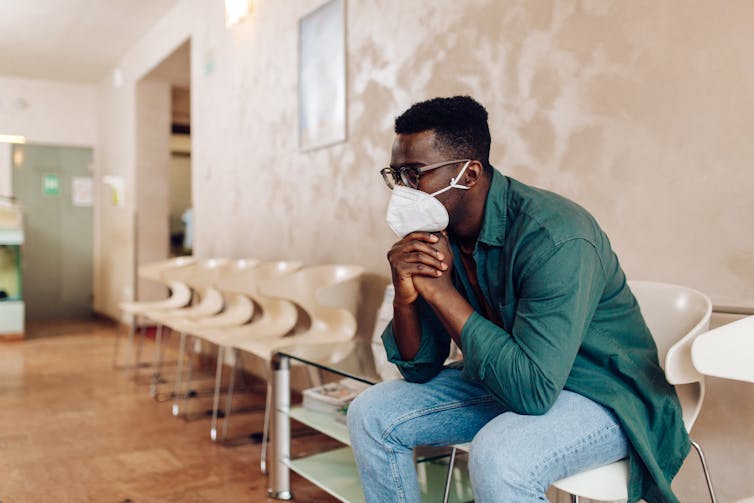Lifestyle
Men are carrying the brunt of the ‘loneliness epidemic’ amid potent societal pressures

Alvin Thomas, University of Wisconsin-Madison and Quinn Kinzer, University of Wisconsin-Madison
A few weeks before Justin Bieber and his wife, Hailey, announced in May 2024 that they were expecting, the pop icon posted a selfie where he appears tearful and distraught.
While media attention quickly pivoted to the pregnancy, there was little attention paid to the significance of a male celebrity and expectant father publicly sharing his vulnerability.
Yet Bieber’s social media post is notable for making his internal struggle visible.
Emotional pain is linked to serious health issues. But the public’s response to male expressions of emotion and vulnerability is often minimizing, if not dismissive. In response to Bieber’s tearful post, for example, Hailey described him as a “pretty crier.”
A year ago, the Canadian rapper Dax released the song “To Be a Man.” He said at the time: “This is a song I poured my heart into. I’m praying this reaches everyone who needs it.”
Today, the song’s message remains timely. It includes the lyrics:
Yeah, I know this life can really beat you down, uh
You wanna scream but you won’t make a sound, uh
Got so much weight that you’ve been holdin’
But won’t show any emotion, as a man, that goes unspoken
As researchers who study fatherhood and the roles that men play in their families, we recognize the loneliness and pain in these lyrics. We have heard fathers describe the toll of attempting to keep a lid on their feelings.
In a recent study we conducted on 75 new and expectant Black fathers, they spoke of the need to address individual and collective trauma. This, they said, would ultimately help support their families. But they said resources to help men with their mental health are often unavailable or very limited. They said they often feel invisible to health providers.
“Being a father and a man,” one participant said, “you have to keep the peace and be strong on the outside. But on the inside, you know, you’re falling apart.”
Dax’s lyrics and our research reflect an enduring social health challenge – the deafening silence that typically surrounds men’s mental health.
The toll of isolation on men
In May 2023, U.S. Surgeon General Dr. Vivek Murthy released an advisory highlighting what he described as an epidemic of loneliness and isolation in the country. Our research confirms this scourge.
Since men’s social support networks – colleagues, family, close childhood friends – are often less robust than women’s, the epidemic disproportionately impacts men. The resulting solitude has very real health consequences.
In Murthy’s report, loneliness is associated with negative health outcomes, including a “29% increased risk of heart disease, a 32% increased risk of stroke, and a 50% increased risk of developing dementia for older adults. Additionally, lacking social connection increases risk of premature death by more than 60%.”
While Murthy’s report focuses on both men and women, research shows that men are less likely than women to seek mental health services. Additionally, men hold more negative attitudes toward seeking help, and they prematurely terminate treatment more often than women.
With these consequences in mind, a caring society may ask: Why are men carrying the brunt of this health risk, and what can be done about it?
Redefining men’s value beyond breadwinning
Many factors can contribute to feelings of isolation and disconnection among men.
In “To Be A Man,” Dax points toward one prominent factor:
As a man, we gotta pave our way
Our only function is to work and slave
There’s no respect for you if you ain’t paid
You’re disregarded as a human and you can’t complain
Traditional definitions of masculinity emphasize the importance of men’s role as breadwinners.
An uncertain economy and increasingly expensive housing and food prices make the ability to financially provide for a family elusive for many men. These factors also undermine men’s sense of self and contribute to loneliness and feelings of isolation.
As partners and fathers, men are still often perceived as deficient if they can’t provide economically. And societal norms stress that they are not valued for their capacity as caregivers, even if they are more involved in raising their children than ever before.
This is out of touch with reality.
Men play an important role as caregivers in their children’s lives, according to our research, and exert a powerful influence on children’s health and well-being. Men also find meaning in their roles as fathers.
As Dax says:
As a man, our son is our horizon
The cost of suppressed vulnerability
Beyond pressures to provide, men also have to overcome enduring stereotypes that suggest they should be stoic and keep their fears and sadness to themselves.
Here, too, gender norms are in need of an update. Boys and men need to feel comfortable presenting their true, authentic selves to the world. When they suppress their vulnerability, it creates a barrier to seeking help. It also perpetuates stigma and the epidemic of loneliness.
There is a complex interplay between society’s assumptions and beliefs about men and fatherhood.
Men, consequently, are less likely than women to seek mental health services. Health providers, as a result, are more likely to underdiagnose and misdiagnose men. Additionally, when health resources are made available, they are often not tailored to men’s needs.
Societal expectations can create unbearable pressure for men. And the most marginalized groups, like low-income Black fathers, bear a disproportionate burden, research shows. This became more evident during the COVID-19 pandemic, when Black fathers working in high-risk and essential jobs prioritized supporting their children and families over their own risk of infection and mental health.
As men continue to redefine their roles within families and communities, it’s important for society to create a space that acknowledges and embraces their vulnerabilities and full humanity in all social roles.
Men need outlets for their pain. They would benefit from relationships – with partners, family and friends – that support and nurture them in times of joy and through the emotional challenges. Their loneliness will continue to be disproportionate without the necessary connection to services.
Men can consider engaging in low-stakes discussion groups in their communities, with online groups and in their churches. They may also seek out therapists in person or online for introductory sessions to test out the therapeutic interaction before establishing a more consistent pattern of therapy services.
In “To Be a Man,” Dax sings:
No wonder most men are so depressed
All the things that they can’t express
It’s the circle of life, as a man, you provide
They don’t know what you’re worth ‘til the day that you die
As the Biebers adjust to life as parents, Justin may find people he can talk to about his experiences and emotions, people who see and value him fully. And we hope the same for every man and father, living their life out of the spotlight and doing the best they can for themselves and for their family.
Alvin Thomas, Associate Professor, Phyllis Northway Faculty Fellow, University of Wisconsin-Madison and Quinn Kinzer, Graduate student and PhD Candidate, Department of Consumer Science, University of Wisconsin-Madison
This article is republished from The Conversation under a Creative Commons license. Read the original article.
Our Lifestyle section on STM Daily News is a hub of inspiration and practical information, offering a range of articles that touch on various aspects of daily life. From tips on family finances to guides for maintaining health and wellness, we strive to empower our readers with knowledge and resources to enhance their lifestyles. Whether you’re seeking outdoor activity ideas, fashion trends, or travel recommendations, our lifestyle section has got you covered. Visit us today at https://stmdailynews.com/category/lifestyle/ and embark on a journey of discovery and self-improvement.
Discover more from Daily News
Subscribe to get the latest posts sent to your email.
health and wellness
Study Links Agent Orange Exposure to Higher Risk of Rare Melanoma
A study revealed that U.S. veterans exposed to Agent Orange are at increased risk of developing acral melanoma, a rare skin cancer located in areas not typically exposed to sunlight. With higher odds of diagnosis and poorer prognosis, early detection in veterans is vital for effective treatment and improved outcomes.

(Feature Impact) A new study found U.S. veterans exposed to Agent Orange face a higher risk of developing a rare and often overlooked form of melanoma that appears on the hands and feet, and under the nails.
Researchers reported in “JAMA Dermatology” that veterans with documented exposure to the herbicide had significantly higher odds of developing acral melanoma, a subtype of skin cancer that forms on the palms, soles and nail beds.
Unlike most melanomas, which are associated with ultraviolet radiation, acral melanoma develops in areas not typically exposed to the sun. It can resemble a bruise under a toenail or a dark patch on the bottom of a foot – locations that are easily missed and not commonly associated with skin cancer.
Because of its unusual appearance and location, acral melanoma is often diagnosed at later stages, when treatment is more difficult and survival rates are lower.
The researchers analyzed 20 years of Veterans Health Administration data, comparing more than 1,200 veterans diagnosed with acral melanoma with more than 5,000 veterans without melanoma. Veterans exposed to Agent Orange had about 30% higher odds of developing the disease.
The findings suggest Agent Orange may be an underrecognized risk factor for acral melanoma, particularly for veterans who may not view themselves as at risk for skin cancer because of limited sun exposure or darker skin tones.
“Identifying exposures that may increase risk can help inform earlier recognition and, ultimately, earlier diagnosis when treatment is most effective,” said Marc Hurlbert, chief executive officer of the Melanoma Research Alliance and a principal investigator on the study.
Senior author Dr. Rebecca I. Hartman of Brigham and Women’s Hospital said acral melanoma behaves differently from other melanomas and often responds less well to current therapies.
“Acral melanoma has a poorer prognosis than the more common cutaneous melanoma because it is often diagnosed at later stages,” Hartman said. “Identifying risk factors is critical to improving detection and outcomes.”
Agent Orange was used extensively during the Vietnam War and exposure has been linked to several cancers and chronic illnesses. These findings add to evidence the herbicide may also affect the skin in ways not reflected in traditional melanoma awareness efforts.
Acral melanoma has also been associated with sex, race and ethnicity, and prior skin lesions. Researchers said the study supports treating the disease as distinct from sun-driven melanomas that dominate public education campaigns.
For veterans, the research highlights the importance of examining less visible areas of the body, including the bottoms of the feet, between the toes and under the nails. Changes in nail color, dark streaks or unexplained spots on the palms or soles should be evaluated by a health care provider, especially for those with known Agent Orange exposure.
Researchers said the findings could help guide future screening strategies for higher-risk populations and encourage further study of why acral melanoma differs biologically from other skin cancers.
Find more information at curemelanoma.org.
Photo courtesy of Shutterstock
SOURCE:
Our Lifestyle section on STM Daily News is a hub of inspiration and practical information, offering a range of articles that touch on various aspects of daily life. From tips on family finances to guides for maintaining health and wellness, we strive to empower our readers with knowledge and resources to enhance their lifestyles. Whether you’re seeking outdoor activity ideas, fashion trends, or travel recommendations, our lifestyle section has got you covered. Visit us today at https://stmdailynews.com/category/lifestyle/ and embark on a journey of discovery and self-improvement.
Discover more from Daily News
Subscribe to get the latest posts sent to your email.
health and wellness
Progress, Not Perfection: How Healthy Habits Can Stack Up One Step at a Time
The article emphasizes that achieving better health relies on progress, not perfection. It advocates for realistic goals and highlights tools like My Life Check for personalized health assessments. Small, manageable changes in diet, exercise, sleep, and stress management can significantly impact overall well-being, making healthy habits more attainable and sustainable.

Progress, Not Perfection: How Healthy Habits Can Stack Up One Step at a Time
(Feature Impact) Despite the best of intentions, it’s common for plans to build healthier habits to fall flat. Often, the culprit isn’t a lack of motivation or discipline; rather, it’s unrealistic expectations.
Overhauling your lifestyle requires a level of commitment that isn’t always practical. Understanding your personal health needs and the challenges you need to overcome can help give you a more realistic roadmap toward better health.
Tools to Guide You
Every plan needs a starting point and there are many reputable sources that can help guide you toward a plan that addresses your personal health needs.
For example, the American Heart Association introduced My Life Check, a simple, free tool to help individuals understand their heart health and what’s driving it. Users answer simple questions about their daily habits and health factors to get a personalized Heart Health Score in minutes.
The results are private and downloadable, giving you full control of your information. The tool turns big goals into small, specific actions you can start right away. Knowing your numbers relative to your heart health (and where you are in comparison to target ranges for optimal health) can help you decide how to build a better map to get you where you want to be.
While the report is customized to each individual, no personal data is stored and answers are only used to calculate health scores and provide personalized recommendations and practical steps to improve your health, so you can use your results to focus on what matters most to you. Every small step you take, such as moving more, eating smarter, sleeping better or managing stress, can add up over time.
Finding Your Path
Once you’re armed with data and know where you stand on your heart health numbers, small steps become clearer and more manageable. That knowledge makes it easier to choose one area to focus on, such as getting more sleep, taking daily walks or adding more color to your meals.
Healthy changes don’t need to be expensive or complicated. The best habits are ones that fit real life when every action you take moves you closer to your goals.
Staying motivated and on track is also easier when you can check back in, see your progress and realize the steps you’re taking are making an impact. Checking in every few months to see how you can grow gives you the chance to celebrate your progress, learn from challenges and keep building lasting habits that feel good.
To get started with personalized tips to set your own health goals, visit heart.org/mylifecheck.
Healthy Habits for Everyday Life
Eat Smart
Choose foods that help you feel your best, one meal at a time. Add more color to your plate and focus on balance, not restriction. Simple, affordable swaps can make a real difference.
Smart Tip: Aim for an overall healthy eating pattern that includes whole foods, fruits and vegetables, lean protein, nuts, seeds and cooking in non-tropical oils such as olive and canola.
Move More
Find movement that fits your life, such as a walk, a stretch or dancing while you cook. Every bit of activity counts and it all supports your heart and mind. Move for joy, not just for results.
Smart Tip:Adults should get 150 minutes of moderate physical activity (or 75 minutes of vigorous activity) per week. Kids should aim for 60 minutes every day, including play and structured activities.
Sleep Well
Rest is a foundation of good health, not a reward. Protect your bedtime routine and give your body the recovery it deserves. Notice how good sleep makes everything else easier.
Smart Tip: Most adults need 7-9 hours of sleep each night. Children require more. Adequate sleep promotes healing, improves brain function and reduces the risk for chronic diseases.
Manage Stress
Check in with yourself regularly, both mentally and emotionally. Create simple moments to pause, breathe, laugh or step outside. Connection, kindness and calm all support a healthy heart.
Smart Tip:The first step to stress management is awareness. Step “away from yourself” for a moment. Objectively ask yourself, “Is my stress level too high?” If so, look at what might be causing that stress.
Ideas for Incremental Changes
- Dedicate 15 minutes at the beginning or end of the day to focus on self-care, whether it’s unwinding with some music, writing down your goals or reflecting on the highlights of the day.
- Aim to add an extra serving of fruits or veggies each day, such as creating a savory veggie omelet or exploring new smoothie blends that let you pack in the produce on the go.
- Give your cabinets a quick update and put the smaller plates front and center. When you use a smaller plate, you can fill it while still sticking to recommended serving sizes.
- If you’re not a fan of the gym, think about how your hobbies can play a role in your physical activity. Even gardening counts as physical activity, so get creative to get moving with an activity you truly enjoy.
- Establish a bedtime routine that allows you to ease into sleep more easily. Once you feel the impact of better-quality rest, you may find yourself more motivated to make a regular bedtime a priority.
Photos courtesy of Shutterstock
SOURCE:
Discover more from Daily News
Subscribe to get the latest posts sent to your email.
Travel
TOP 5 THINGS TO DO IN ENCINITAS, CALIFORNIA THIS MEMORIAL DAY WEEKEND
Last Updated on February 15, 2026 by Daily News Staff

ENCINITAS, CALIFORNIA, USA /EINPresswire.com/ — California’s gem, the surfside city of Encinitas and The Encinitas Visitors Center are announcing Memorial Day activities for 2022. The beachside oasis takes the beach seriously, and with six miles of Pacific Ocean coastline to its name, the small community is a beautiful reminder of the historic Highway 101 beach culture that has thrived since the mid-1900s. It’s no surprise that the City of Encinitas was named as one of the best surf towns in the world. Here are top 5 activities for visitors to enjoy.
1. Go to the beach! Some of the best beaches in Encinitas include legendary surfing hotspots like Beacon’s, Grandview, Stone Steps, Moonlight State Beach, and Swami’s. These beaches are also some of the best in the country for sunbathing, relaxing, or spending a beach day with the family.
2. Take surf lessons! Live the life of a San Diegan for a day and enjoy the popular sport of surfing! There are many to choose from, including Encinitas Surf Lessons https://www.encinitassurflessons.com/ Pacific Surf https://www.pacificsurf.com/surfing-lessons-encinitas/ and Aqua Surf https://www.aquasurf.com/encinitas that offer group lessons, quality equipment, good surf and exciting lessons from a lifelong surfer.
3. Have a beach bonfire and BBQ! Moonlight Beach is one of the few area beaches that has picnic tables, bonfires, a playground, volleyball, lifeguard towers, easy parking and no stair access that creates a perfect family-oriented trip to the beach. A recent 6 million dollar renovation presents clean bathrooms, an additional 10,000 square feet of sandy area, and a new concession stand.
4. Tour the Encinitas Historical Society! Visitors to the Encinitas Historical Society are in for a treat, as the organization is located in an 1883-era one-room schoolhouse built for the eight children that lived in the town at that time. Discover the history of this unique city through photographs, exhibits, research papers, and docents eager to share their story.
5. Eat, drink and shop by the beach! The quaint downtown Encinitas shopping district is more than 100 years old. Today, the historic corridor along Highway 101 is home to sidewalk cafes, cute boutiques and shops, great restaurants and breweries. A few local favorites include Le Papagayo, Vigilucci’s Trattoria Italiana, Solterra Winery and Kitchen and the Potato Shack Café.
And don’t forget, on Memorial Day, to be part of the National Moment of Remembrance by pausing for a moment of silence at 3 pm local time. Take one minute to remember those who have died serving our country so that we are able to enjoy our freedom.
For more information about Encinitas and all it has to offer year-round, go to https://www.encinitasvisitorscenter.com/
https://stmdailynews.com/category/lifestyle
Discover more from Daily News
Subscribe to get the latest posts sent to your email.

